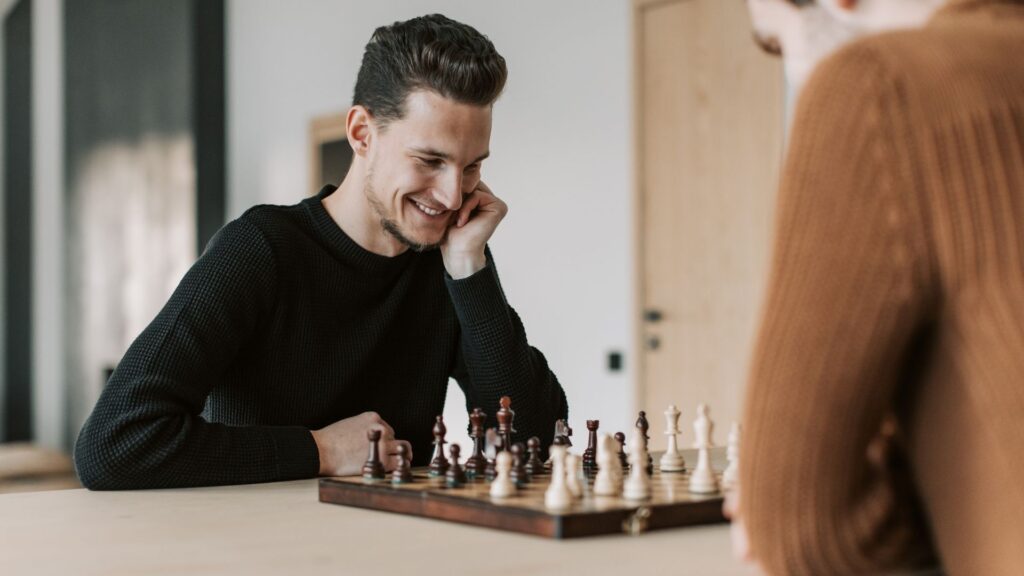Chess is a game of strategy and tactics, where one wrong move can lose you the match. The pieces have unique abilities that make them potent weapons in battle and give players many options.
The chessboard is a complex space with 64 squares that require knowledge to conquer. It takes more than just knowing the rules, you need an understanding of how this battlefield works and what moves are available for your warriors in order to have any hope of winning.
But, “How many chess moves are there?” This is a question that has puzzled people for centuries. Even some of the greatest minds have been unable to come up with a precise answer. But while we may never know the actual number of moves, we can certainly get a reasonable estimate.
In this blog post, we’ll look at the mathematics behind calculating how many chess moves are possible and explore some of the implications of this number.”

Contents
How many chess moves are there?
The game of Chess has evolved a lot as it spread around the world until it arrived in the way we know it today. Some believe that Chess is quite complex, and some studies show that there are about 170 septillion ways to make the first ten moves in a chess game, and after just four moves, the number of possible combinations in the match reaches 315 billion.
According to researchers, the universe has fewer atoms than possible chess moves. The comparison in numbers reveals that there are 10 81 estimated atoms in the universe (to make it clear, multiply 10 by itself 81 times).
On the other hand, there are 10 120 possible chess moves. These numbers are based upon very scrutinized estimations by American mathematician Claude Shannon, who calculated this estimate in 1950. This calculation for chess moves is known as Shannon’s number. Shannon’s number also includes illegal chess moves.
How many moves are most chess games?
Chess is one of the most strategic games with many possible moves; however, most games end with about 40 moves for each side. But strategically speaking, the first ten moves of the game determine the outcome.
Is 40 moves a lot in chess?
Forty moves for a chess game is not a lot but rather about the average length it takes to finish a game. However, many people would say that 40 moves seem too little when you consider all aspects involved in playing and calculating each move.
How many moves are there after your first two moves?
There are a lot of different ways to play Chess. Some people like to be very aggressive, while others take a more strategic approach.
Chess is a complex game with infinite possibilities, but it all starts in the opening. The first two moves are considered “the most important” because they set up your position for what comes later on during play; there are about 13000 different chess openings after your first two moves.
Is there a finite number of chess moves?
There is not a finite number of chess moves; however, you can set a limit on the number of moves before calling a draw, such as the “50 move draw rule.” The fifty-move rule is a chess theory that states you can claim a draw if the Kings haven’t been captured or pawn hasn’t been moved in the last fifty consecutive moves.
There are a few other similar rules like the 25 moves rule or 16 moves rules which at some points cap the game but are not acknowledged widely.
Mathematically, we talk about the possibilities of chess moves, and literally, the possibilities are endless or infinite. Though some say there is also a limit to the number of chess moves, the latest computers are still calculating the possibilities and have not yet reached a finite number.
The actual complexity related to infinity lies in evaluating the available options of action because, in just ten moves, you already have 10 trillion possible moves.

How many moves does the average chess player think ahead?
Chess is a game of thinking. Every move you make prompts your brain to adapt and think about what could happen next; while most people would only consider the possibilities facing them now, Chess requires you to think much further down the road.
So, how many moves ahead does the average chess player think? Most people would say that the average chess player thinks about 3-5 moves ahead. However, some grandmasters can see up to 20 or more moves ahead.
There is also a difference in defensive and offensive planning. When in a defensive position, the average player can think between 6-15 moves ahead, and in an attacking stance, the average player thinks between 2-5 moves.
This shows how important it is for a chess players to think ahead and plan their next few moves. It’s also essential for them to be able to adapt to their opponent’s moves quickly.
How many moves ahead should I plan in chess?
In Chess, the player with the white pieces moves first. This is an advantage because it allows the player to control how the game progresses. The player with white can choose to attack or defend, whereas black has to react to white’s moves.
So, how many moves ahead should you plan when playing as white? It depends on the situation, but a good rule of thumb is to think 5-7 moves ahead. That way, you’ll always be in control of the game.
However, you need to consider your opponent’s strengths and weaknesses and how the game unfolds. For example, in Blitz chess, a fast format, planning two moves ahead will do good; otherwise, you can lose focus due to the time factor. For a game without time constraints, thinking 5-7 moves ahead would be wise.
FAQ
Can a knight jump over a queen?
Yes, a knight can jump over a queen and any other piece in its path, including its own pieces.
Is Go harder than chess?
Some people say that Go is more challenging because it has more possible moves than Chess. Others contend that Chess is more difficult because of its complicated rules. I think Chess is a harder game, but the answer is subjective.
Is chess a solved game?
No, Chess is technically unsolvable because of all the various moves you can make in a game. No matter how many you’ve played there is always something new to witness.
